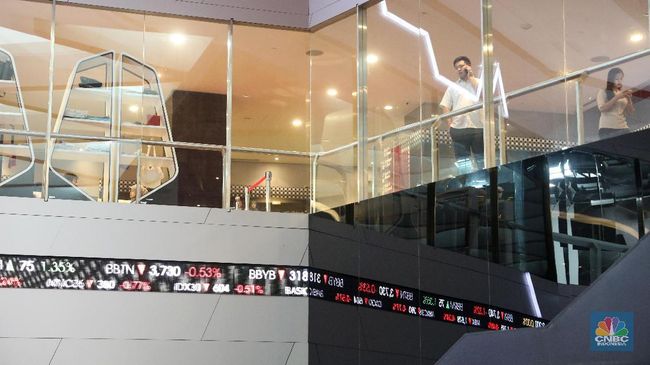Jakarta, CNBC Indonesia – A gray Wednesday hit the national capital market with investors selling off that triggered corrections in stocks, money markets, and even debt securities following poor national economic signals. Today, it’s a good idea to trade while monitoring the risk of occurrence tapering bulk.
The Composite Stock Price Index (JCI) on Wednesday (8/9/2021) was in the red zone at the close after Bank Indonesia (BI) released data on the consumer confidence index (IKK) for the August period, which experienced a decline.
The country’s benchmark stock exchange index closed down 1.41% or 86.4 points to 6,026.02. JCI even almost came out of its psychological zone by touching its daily low at the level of 6,001,579.
Trade data noted that the transaction value rose again to Rp 12.1 trillion, but foreign investors have a position short (selling), thus printing net sales (net sell) of Rp 645 billion in the regular market. A total of 376 stocks fell, 138 rose and the remaining 142 were flat.
The correction occurred after the Indonesian people were indicated to be increasingly insecure in facing the current economic situation and the next few months. Restrictions on activities in the context of controlling the Covid-19 virus pandemic hinder the prospect of economic recovery.
The Consumer Survey conducted by Bank Indonesia resulted in the Consumer Confidence Index (IKK) at the level of 77.3, down from the previous month’s position of 80.2. The IKK uses the number 100 as the threshold. If it is below 100, it means that consumers are pessimistic about the economic prospects for the next 6 months.
“The Bank Indonesia Consumer Survey in August 2021 indicated that consumer confidence in economic conditions was still restrained, in line with the continued mobility restriction policy during the survey period to overcome the spread of the Delta Covid-19 variant,” BI wrote in an official statement on Wednesday (8/9/2021). .
Pressure also hit the currency market where the rupiah finally weakened against the United States (US) dollar after scoring 4 consecutive days of strengthening. As soon as the trading bell rang, the rupiah immediately weakened 0.14% to Rp 14,230/US$.
The depreciation of the Garuda currency was getting thicker by 0.42% at Rp. 14,370/US$ and at the end of trading it was at Rp. 14,250/US$, or 0.28% lower in the spot market. The rupiah joined most of the major Asian currencies which were also under pressure against the US dollar. Only the Chinese yuan, Japanese yen and Philippine peso strengthened, albeit slightly.
Meanwhile, the prices of the majority of government bonds or Government Securities (SBN) closed lower again following the decline in US government bond yields ahead of the release of employment data.
The majority of investors returned to release SBN, marked by strengthening yields (yield) in almost all tenors. Only 3 -year -old SBN is still being hunted by investors and is weakening yield by 1 basis point (bp) to 3.934%. Meanwhile, yield The 10 -year tenor SBN, which is the market reference, strengthened 3.5 bp to the level of 6.151% today.
Yield the opposite direction of the price, so that an increase in yield indicates a weakening bond price, and vice versa. The unit of calculation of a basis point is equal to 1/100 of 1%.
– .


